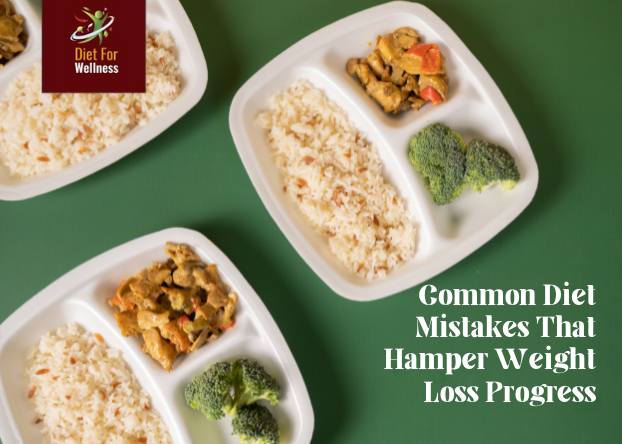Common Diet Mistakes That Hamper Weight Loss Progress

Many of us dive headfirst into weight loss journeys, full of enthusiasm and high hopes. However, the initial excitement often fades as we encounter unexpected challenges and slow progress.
Two common pitfalls that can derail our efforts are unrealistic expectations and a lack of a solid plan. Setting achievable goals and embracing a gradual approach are key to long-term success.
Sustainable weight loss is just like a marathon. You will have to aim for steady progress instead of quick fixes. You need to focus on healthy habits and making small, consistent changes to achieve your weight loss goals and maintain them for life.
A flexible approach is essential. It’s okay to have occasional indulgences. The key is to maintain balance and prioritize your overall health and well-being.
Common Diet Mistakes That Can Derail Your Weight Loss Goals
When it comes to weight loss, staying consistent is the key. A well-crafted plan can help you stay on track and avoid common pitfalls that can sabotage your progress. Listed below are some common diet mistakes that can slow down or hamper your weight loss journey:
Skipping Breakfast
Many people skip breakfast believing it cuts calories and speeds up weight loss. However, skipping this crucial meal often backfires. Skipping breakfast can lead to low energy levels, poor concentration, and intense hunger later in the day, often resulting in overeating or choosing unhealthy snacks. So, make sure to start your day with a balanced meal that includes lean protein, healthy fats, and complex carbohydrates.
Over-reliance on Diet Foods
“Low-fat,” “sugar-free,” or “diet” labeled products may seem like the perfect shortcut to weight loss. Many of these foods are highly processed and loaded with artificial sweeteners, additives, and hidden sugars that can hinder your progress. You should focus on whole, unprocessed foods like fresh vegetables, fruits, lean proteins, and healthy fats. Natural, nutrient-rich foods not only support weight loss but also promote overall health.
Drinking Too Many Sugary Beverages
Sugary drinks are calorie-dense but lack the nutrients necessary to keep you satiated. These beverages, including sodas, energy drinks, and even fruit juices, contribute empty calories that can add up quickly. Have water, herbal teas, or black coffee to stay hydrated. Adding slices of lemon, cucumber, or mint can enhance the flavor without adding sugar.
Ignoring Hidden Sugars
Many foods that appear healthy can contain added sugars, which sabotage weight loss efforts. Hidden sugars are found in unsuspecting items like salad dressings, bread, and yogurt, which can spike insulin levels and lead to fat storage. Always read nutrition labels. Opt for unsweetened or low-sugar versions of common items, and make homemade dressings or sauces whenever possible.
Stress Eating
Emotional or stress eating often leads to consuming comfort foods that are high in calories and low in nutrients. Stress can trigger cravings for sugary or fatty foods, creating a cycle of overeating and guilt. Find healthier ways to manage stress, such as journaling, practicing mindfulness, yoga, or engaging in a favorite hobby. Keeping healthy snacks on hand can also reduce impulsive junk food consumption.
Lack of Sleep
Poor sleep patterns can disrupt your weight loss journey by affecting hunger-regulating hormones like ghrelin and leptin. Insufficient sleep increases cravings for high-calorie foods and diminishes willpower, making it harder to resist unhealthy choices. Try to get 7–9 hours of quality sleep per night. Set a consistent bedtime routine, don’t be on screen much before bed, and create a comfortable sleep environment.
Ignoring Fiber
Fiber is a weight-loss powerhouse, yet it’s often overlooked in favor of low-carb or high-protein diets. Fiber slows digestion, keeps you full for longer, and prevents overeating. A diet lacking in fiber can lead to poor digestion and hunger spikes. Incorporate fiber-rich foods like vegetables, fruits, legumes, and whole grains into your meals. Snack on high-fiber options like carrots or a handful of almonds.
Unrealistic Expectations
Many start their weight loss journey expecting quick results, which can lead to frustration and a sense of failure when progress is slow. Unrealistic goals often result in unhealthy practices, like crash dieting or over-exercising, which are unsustainable and harmful. Set realistic, measurable goals like losing 1–2 kilos per week. Celebrate small milestones to stay motivated and focus on long-term lifestyle changes rather than temporary fixes.
If you avoid these common diet mistakes and adopt healthy habits, you will be able to achieve your weight loss goals and improve your overall health. Weight loss can easily be achieved with consistency and balance.
Start small, stay consistent, and celebrate every step of the way.
